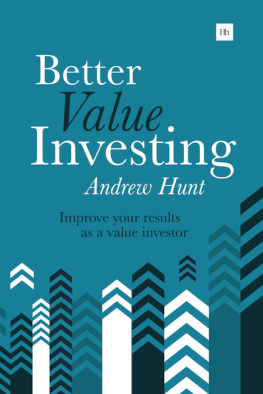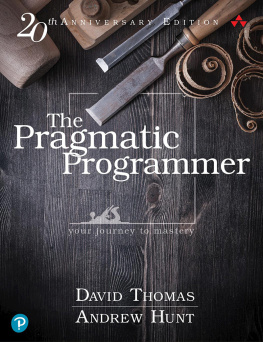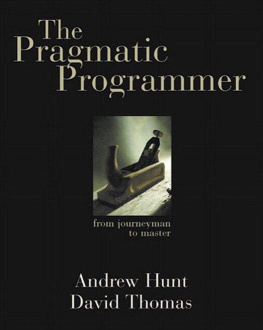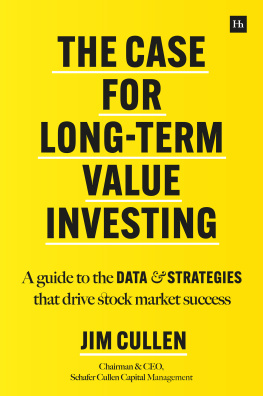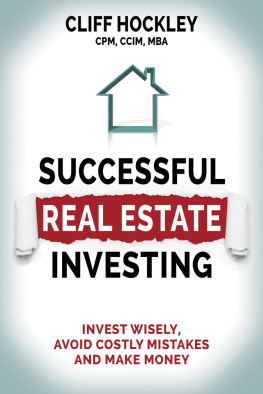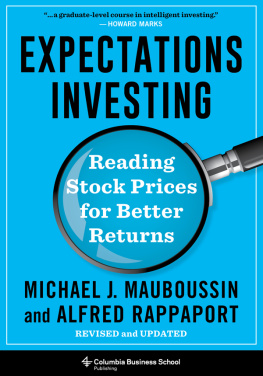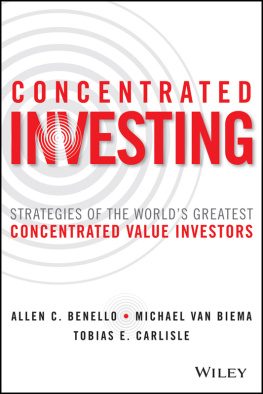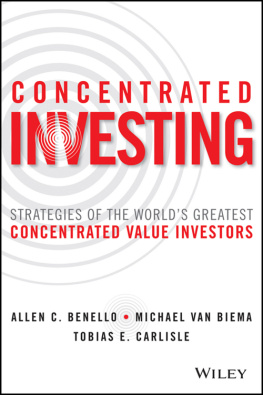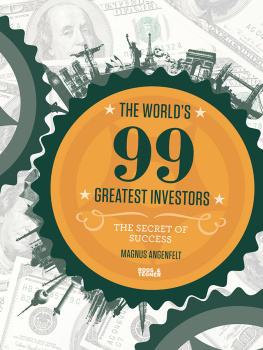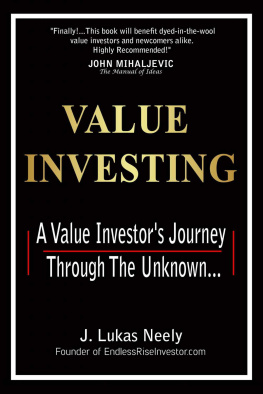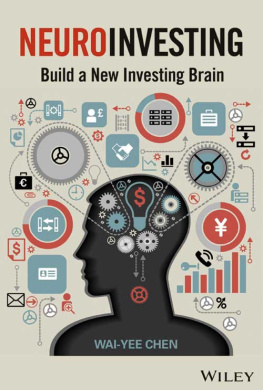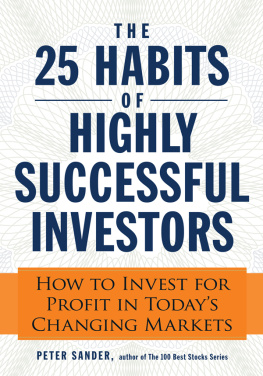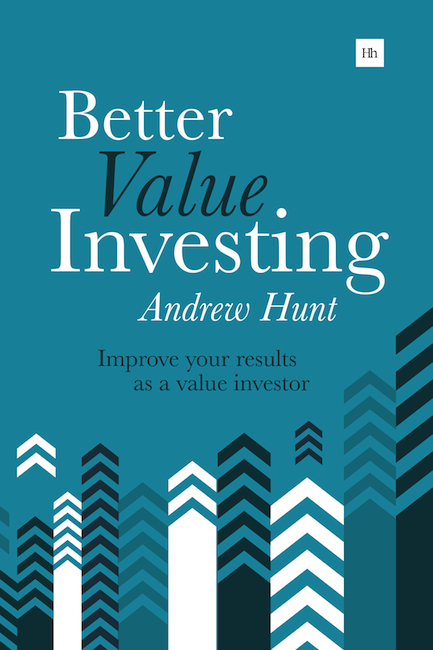Better
Value Investing
Improve your results as a
value investor
Andrew Hunt
HARRIMAN HOUSE LTD
18 College Street
Petersfield
Hampshire
GU31 4AD
GREAT BRITAIN
Tel: +44 (0)1730 233870
Email: contact@harriman-house.com
Website: www.harriman-house.com
First published in Great Britain in 2015
Copyright Andrew Hunt
The right of Andrew Hunt to be identified as the Author has been asserted in accordance with the Copyright, Designs and Patents Act 1988.
Paperback ISBN: 9780857194749
eBook ISBN: 9780857194978
British Library Cataloguing in Publication Data
A CIP catalogue record for this book can be obtained from the British Library.
All rights reserved; no part of this publication may be reproduced, stored in a retrieval system, or transmitted in any form or by any means, electronic, mechanical, photocopying, recording, or otherwise without the prior written permission of the Publisher. This book may not be lent, resold, hired out or otherwise disposed of by way of trade in any form of binding or cover other than that in which it is published, without the prior written consent of the Publisher.
No responsibility for loss occasioned to any person or corporate body acting or refraining to act as a result of reading material in this book can be accepted by the Publisher, by the Author, or by the Employer of the Author.
Contents
About the author
Andrew Hunt graduated from Cambridge with a Law degree in 2003. He worked in TV production before moving to Edinburgh in 2006 to join Baillie Gifford, where he works as an Investment Manager.
All views expressed in this book are Andrews own and not those of Baillie Gifford.
Preface
This book is about value investing in the stock market. Specifically, it explains how to become a better value investor.
True value investors are, and always have been, a rare breed. To the majority of observers, value investors relentless focus on intrinsic value combined with a peculiarly independent and patient temperament provokes, at best, curious indifference, and at worst, outright contempt. But for a small minority, the value discipline is the most natural and intuitive thing in the world. It just clicks. Warren Buffett has quipped that there must be a value investing gene.
Yet value investors are not all created equal; some are better at it than others. What separates the merely good from the great is the ability to go beyond the proclivity that brought them to value investing in the first place: to improve and to keep progressing. The purpose of this book is to show how value investors can improve in ways that are relatively simple and achievable.
First and foremost, this is a practical book. It has been 15 years in the making, and it draws on personal experience, cutting-edge research, deep thought, wide reading, and thousands of hours of discussion and debate. It is intended for use by personal and professional investors (I am both), and by domestic and global investors alike. The lessons of value investing are universal and can be applied by any investor in any market.
It is also a simple book. In investing, simplicity and practicality go hand-in-hand. The concepts and methods for improvement can be understood and applied by anyone. However, I do assume some basic investing knowledge. To get the most out of the book, you will need to be able to find your way around a set of accounts and understand basic valuation ratios.
The book can be viewed as a coherent framework for value investing, or more likely you will want to take a few of the many ideas and incorporate them into your existing approach. Crucially, these ideas are not just theory or conjecture. I draw heavily on empirical research (which is referenced throughout) and the testimonies of highly successful long-term investors. I am confident you will find many useful and simple ways to improve your investing.
The book is divided into ten chapters. Each chapter identifies and explains a small number of common pitfalls, and offers simple and practical solutions to them, culminating with a short summary and some helpful checklists.
The first two chapters are introductory. Chapter 1 provides a summary of what value investing is and explains its core principles. In Chapter 2, I look at how value investing can go wrong, why it can be improved, and how investors can improve.
Chapters 3, 4 and 5 deal with appraising potential investments. Chapter 3 explains the importance of properly assessing financial strength when choosing value shares, and goes through the techniques that should be used to thoroughly appraise a companys financial position. Chapter 4 outlines how to assess management and to complete due diligence checks, and includes a handy list of factors to consider when doing so. In Chapter 5 I look at valuation specifically, how and when to use a range of different valuation techniques to achieve better results.
The remaining chapters focus on investment strategy. Chapters 6 and 7 deal with when and where to look for investments. Chapter 6 is an in-depth exploration of contrarian investing and how it relates to value investing, including how to invest during crises. Chapter 7 examines how global and small-cap approaches to investing can enhance returns.
Chapter 8 explains how to construct and maintain a portfolio of value shares. A key component of portfolio construction is ensuring sufficient diversification, so that the portfolio is not overwhelmed by unexpected events. The chapter then outlines how to buy and sell shares in a more disciplined and effective manner. This process of portfolio rebalancing is a vital but often neglected element of successful value investing.
Then we come to Chapter 9, which in my opinion is the most important and the most rewarding. I begin by describing how investors invariably do not achieve the results they expect in large part because they fail to stick to the strategy they set out to follow.
While all investors struggle to stick to their plans, value investors are especially prone to this because of behavioural pitfalls and social pressures. I detail some powerful methods to overcome these pitfalls and execute a value investing strategy consistently. This includes an examination of checklists an innovation that is gaining increasing attention in many fields, both within finance and beyond.
Lastly, Chapter 10 considers the importance of ongoing improvement and lifelong learning, before concluding with a summary of the key messages covered throughout.
When value investing is conducted well, there is an innate pleasure about it that transcends the mere end of making money. I hope that in reading this book, you will discover ideas that are sufficiently valuable to carry with you throughout your investing life, and that bring you a little more of that pleasure.
Andrew Hunt
Edinburgh, Spring 2015
Part I.
Introduction
Chapter 1.
Value Investing 101
1.1 What is value investing?
Value investing is buying securities at a significant discount to their underlying value and holding them until their value is realized. The element of the bargain is the key to the process.
Seth Klarman
I n this chapter Ill go through the basics of value investing.
Value investing is defined by a set of principles rather than hard and fast rules. These principles were popularised and articulated by Benjamin Graham nearly a century ago in two famous books, Security Analysis and The Intelligent Investor .
The practice of trading shares in businesses goes back centuries. Historically, shares were seen as highly speculative investments: a tool for punters to take bets on the short-term moves in a companys or an economys fortunes. This view can be well understood, as early share trading proved tumultuous on more than one occasion, such as during the infamous Mississippi and South Sea bubbles. Conservative investors meanwhile bought bonds, with steady and predictable cash flow profiles.

